As friends on the Bidon podcast remarked in their Giro preview show, the Giro is on course for the longest ever streak without an Italian winner, the last time the race had a home winner was Vincenzo Nibali in 2016. He’s just announced he’s retiring and it’d be nice to be able to list several candidates rising up the ranks who could replace him but that’s not easy… still let’s have a go.
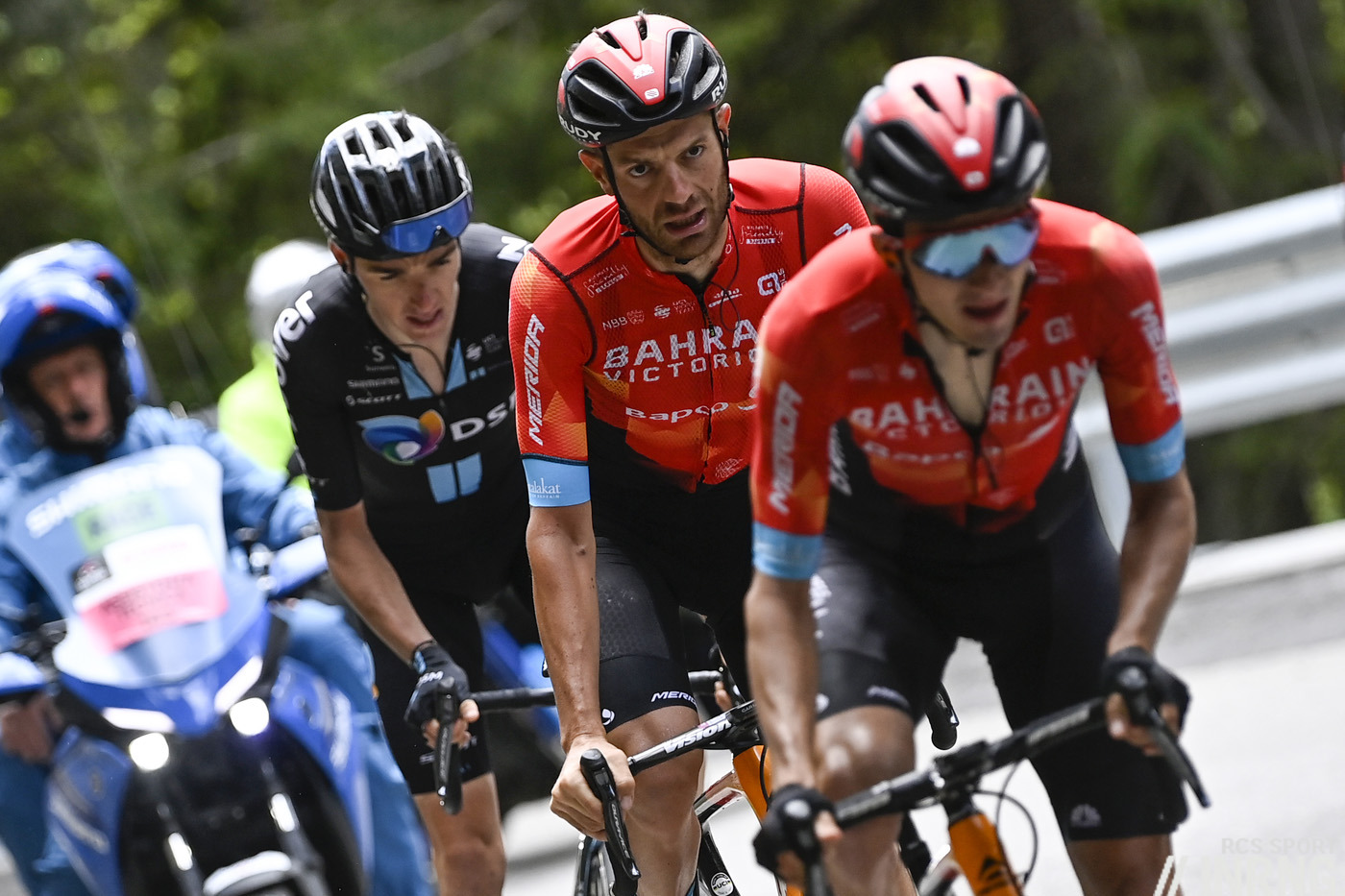
Obviously there’s Damiano Caruso (Bahrain) given he was second in last year’s Giro. He’s going to the Tour de France and so he could return to try and win the Giro in 2023 aged 35. Only it’s hard to see the win, his second place last year was down to steady, consistent riding but the gap between his second place on the podium and the top step was very high.
Antonio Tiberi has time on his side. The Trek-Segafredo rider is being groomed for stage races after winning the time trial at the junior world championships in 2019. He’s 20 years old now and he and his team are no rush, he’ll do his first grand tour in the Vuelta. The likes of Remco Evenepoel and Tadej Pogačar can condition us to thinking that riders can win big by the age of 21 if they’ve got the talent but it’s not so simple, other riders can require more time so Tiberi could be worth waiting for.
At the suggestion of Richard S in the comments below, let’s add Tiberi’s team mate Giulio Ciccone into the list here. While some wait for Tiberi, Ciccone’s probably trying the patience of some Italian fans as his progress hasn’t been so rapid. A Giro mountain stage win in 2016, another stage and the mountains prize in the 2019 Giro but since then some steady rides rather than more progress which makes the current Giro an important test. Is he really a climber for the big mountain passes or better suited to shorter, punchier mid-mountain days?
Is Alessandro Covi going to turn out more like Diego Ulissi or Vincenzo Nibali? The 23 year old “Puma of Taino” is a big talent. He was second on the Strade Bianche stage of the Giro last year and has two wins this season already, one of them saw him beating Miguel Angel Lopez in an uphill finish. A future Giro winner? At the moment he’s not talked about in this way but he looks a promising rider all the same.
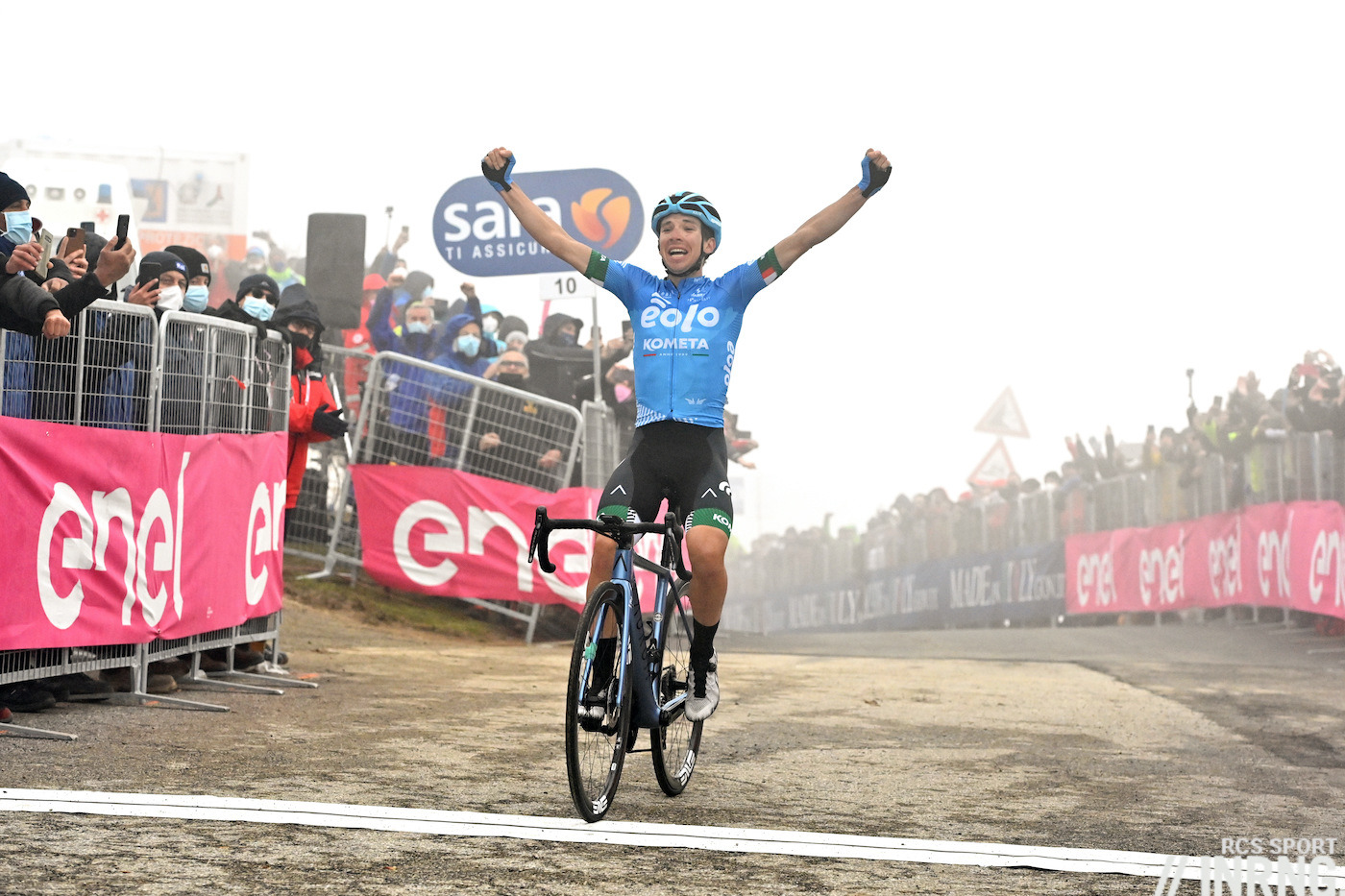
Lorenzo Fortunato (Eolo-Kometa) won the Zoncolan stage of the Giro last year. At the time it was a surprise, a plucky climber who held on to win the stage. But he’s backed this up with some solid riding and it’s said he’s bound for the World Tour.
Bora-hansgrohe ride the Giro now with three leaders plus Lennard Kämna as a joker for stage wins. There’s also Giovanni Aleotti who turns 23 soon. Second in the Tour de l’Avenir in 2019 behind Tobias Foss, he was a solid 11th in the Tour of Poland last year and won the Sibiu Tour too so he’s starting to deliver already.
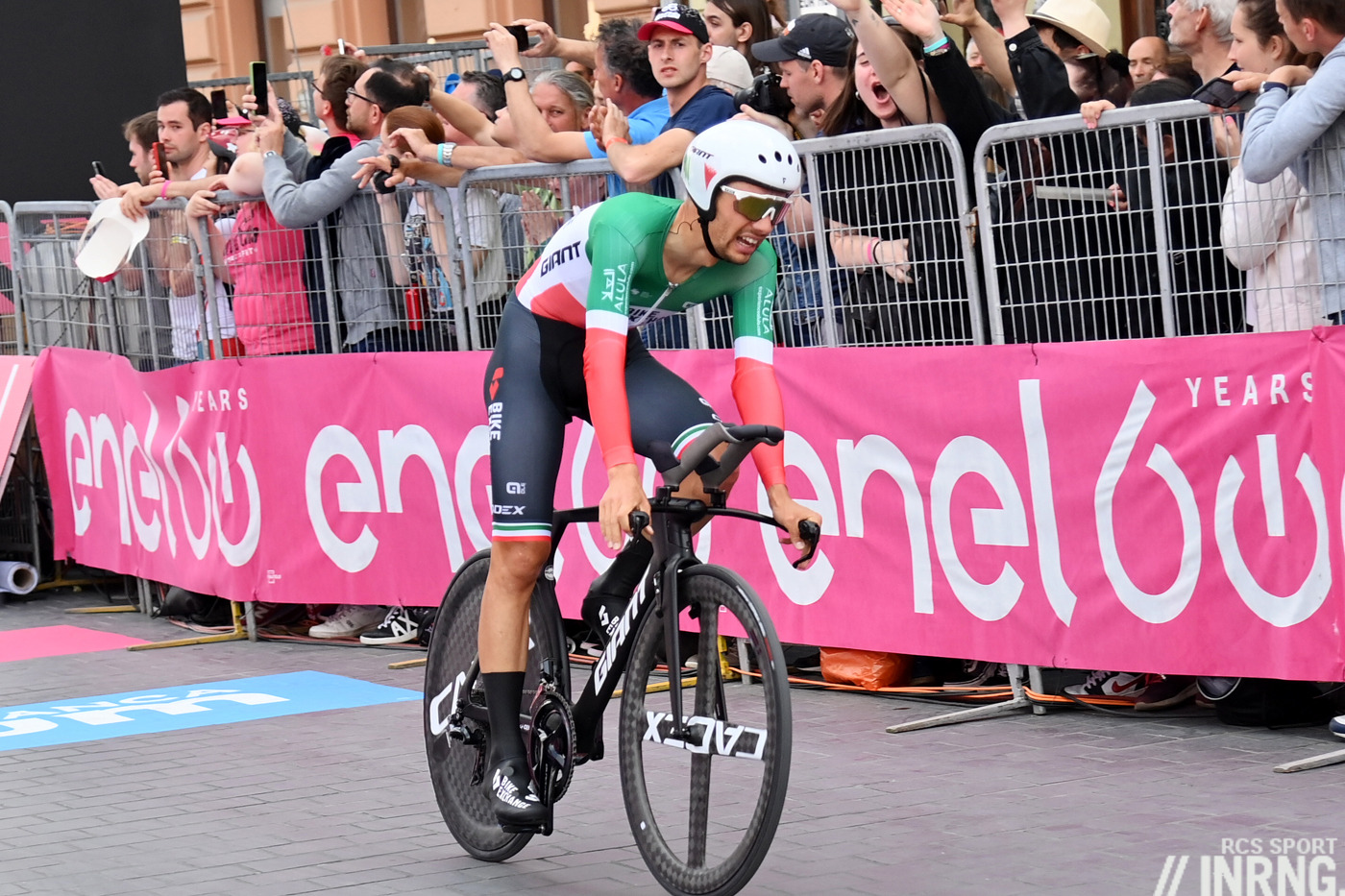
Matteo Sobrero (BikeExchange-Jayco) is the current Italian TT champion, putting time into riders like Affini and Ganna and he’s a versatile rider who is light enough to climb well. Speaking recently to The Cycling Podcast, team manager Matt White said they see him as a project for week-long stage races as well. Team mate Kevin Colleoni is a promising peer too.
So is Samuele Battistella (Astana) although he might find the high mountains too much. He is a talent all the same for other races, both one day and shorter stage races. The “Ironman of Castelfranco Veneto” comes from a family that’s big in industrial ironing and was the U23 world champion from the Yorkshire world championships.
Filippo Zana (Bardiani-CSF) is a climber – and keen equestrian – who’s been a pro since 2020 and rode the Giro last year before finishing third in the Tour de l’Avenir too and he’s been racking up similar results in smaller races, the next test is to see what he can do in bigger races starting with the Giro’s breakaways and mountain stages.
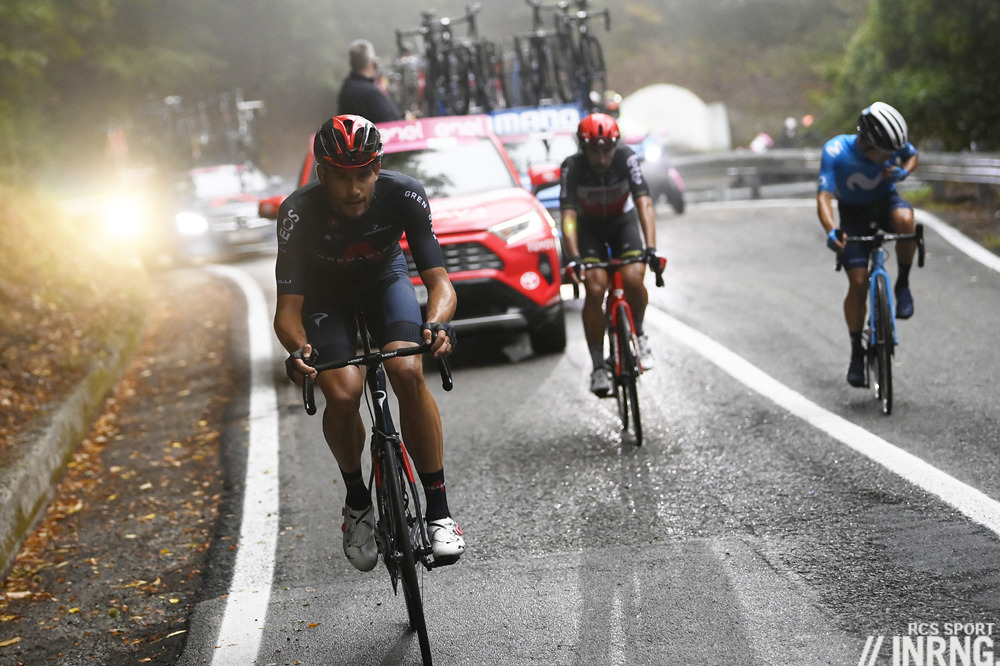
Now what if the most likely winner of the Giro was Filippo Ganna (Ineos)? This would require a radical, even conspiratorial course design. There’s nothing to stop RCS from having 21 time trial stages but more realistically we’re talking a Giro still with mountains stages but fewer of them, plus a prologue and two long time trials where he could put minutes into others. There are many precedents for this, the 2009 Tour de Suisse was flattened to enable Fabian Cancellara to win, Jens Voigt found the Tour of Germany route suited and the Giro itself has seen routes suited to its stars whether Francesco Moser in 1984 but that was a long time ago when TV rights abroad weren’t as valuable as they are today.
Ganna is a star of Italian cycling though and just having him on the startline, winning two time trials and a road stage is plenty to hook in the general public in Italy, especially if the course design allows him to get into the maglia rosa early, defend it valiantly on a mid-mountain stage, reclaim it in a TT before eventually saying addio in the Alps. Plus for Ganna it’s arguably better to occupy a niche as the world’s best time triallist rather than overextend himself. But for all the names cited above, perhaps he’s the one who could win the Giro? You can toy with the course for all the other names and they’re unlikely to triumph in the near future.
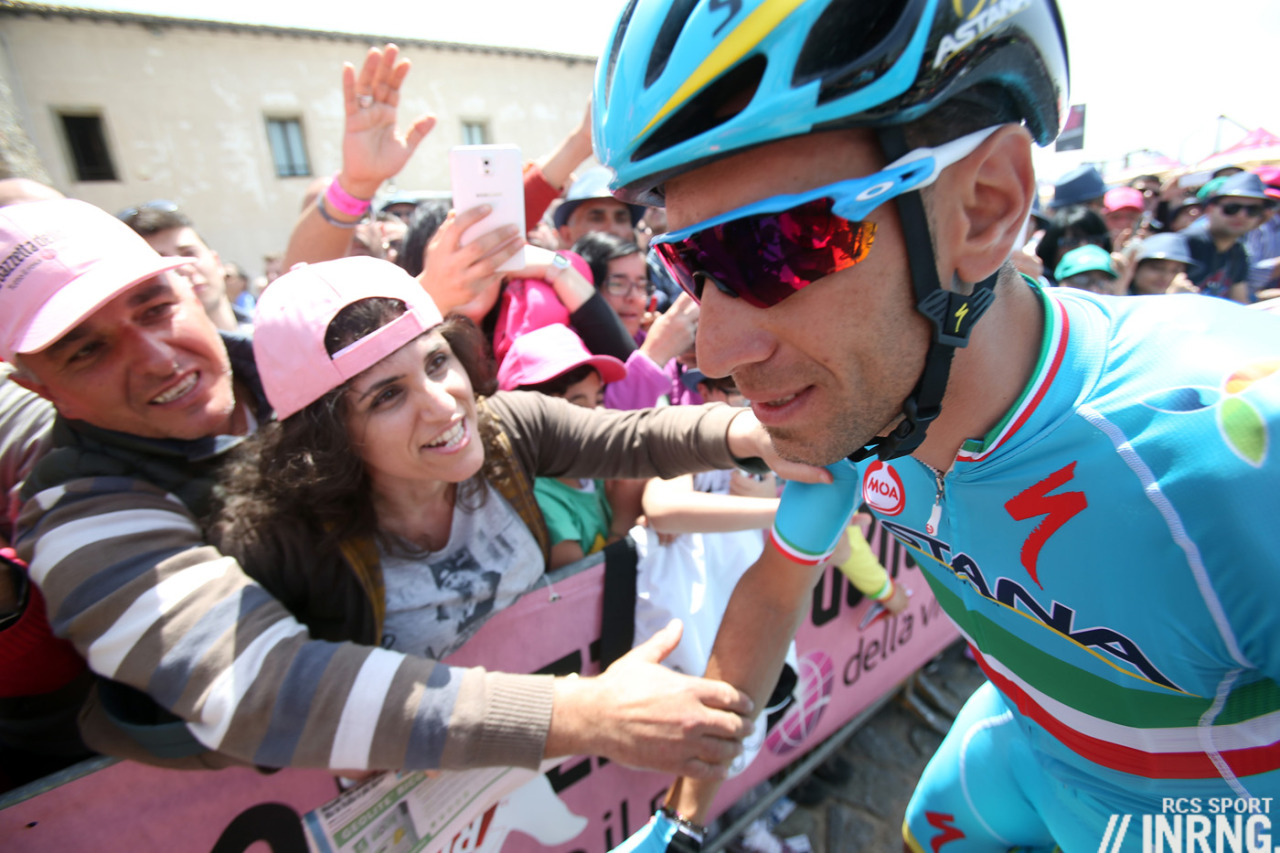
All told it’s a big ask to find someone capable of filling Vincenzo Nibali’s Sidis. There’s no automatic pass for an Italian to thrive in their home race, the sport is more international than ever and being a local contender doesn’t make anyone pedal faster, pressure and expectation can build into a burden but local heroes do help bring out the crowds.
Structurally hosting the Giro is an advantage for Italian cycling and if there’s no obvious candidate today, there could be soon. There’s a reason Juan Ayuso went to race in Italy before turning pro, or why the British and Australian U23 road teams have bases in Italy and it’s neither the weather nor the food: Italy’s got a dense network of clubs, amateur teams and a thriving U23 scene with a variety of races.

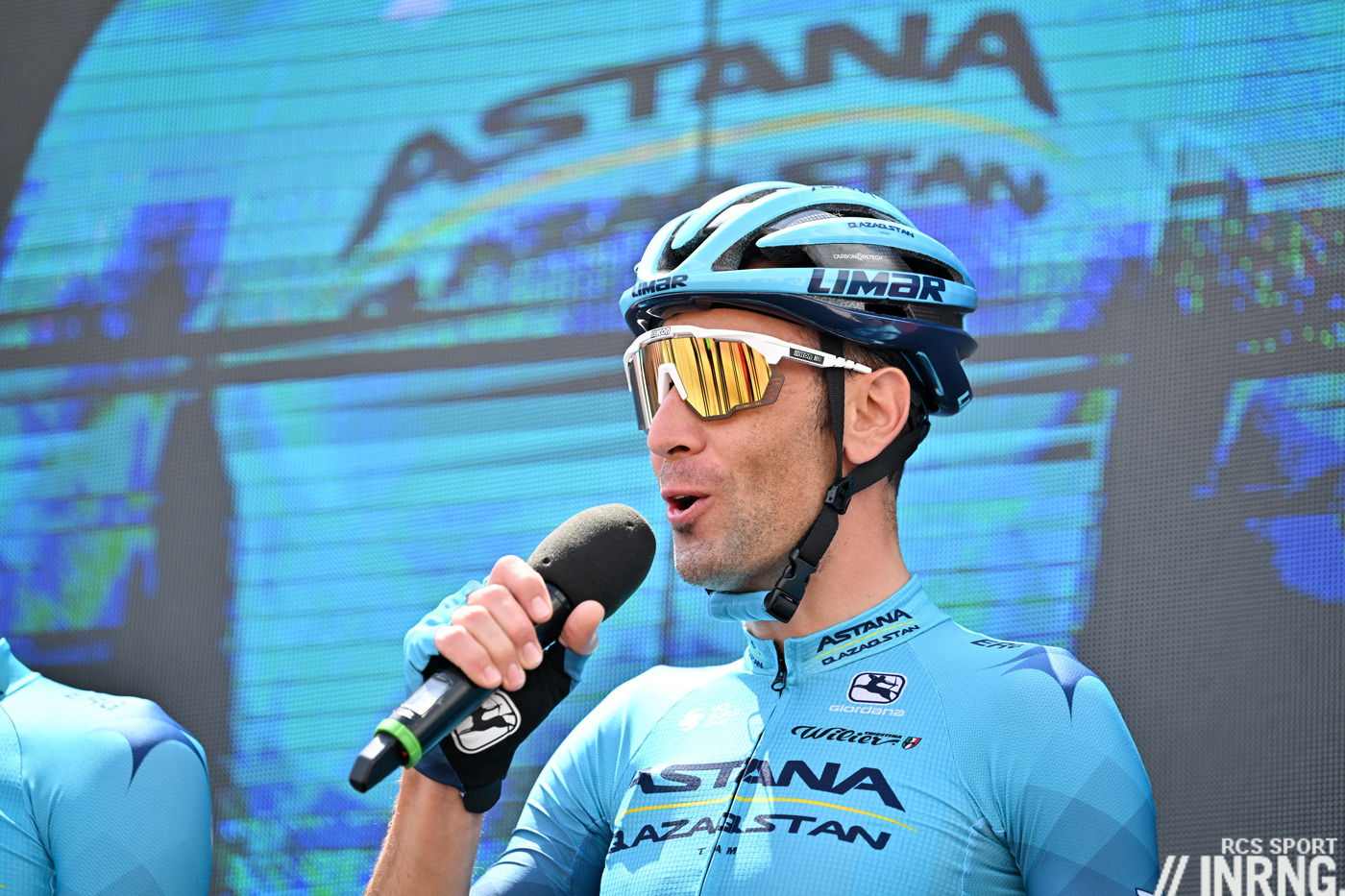
Has to be Ganna, surely?
Right basic skill set, right team, right age to make a conversion to a lighter TT / climber in the short – mid term.
I guess it’s just what he wants to do, his aims within the team and how this would complement their other riders?
If he went for it, there’s absolutely no doubt that RCS would provide a course to suit.
They courted Wiggins, Froome, Dumoulin, Roglic in recent years.
Maybe even Larry would then go for an Italian ‘zap them in the chrono / defend in the mountains’?
I am a big fan of Ganna but can’t recall seeing him do much going uphill. Time trial legs don’t last forever. Cancellara got overhauled by Martin, Dennis won a couple and now it is Ganna (even though Cancellara did fit in a gold medal at the end).
Would like to see him do an Indurain but there are no signs so far.
You’d have said the same thing about Rohan Dennis himself about 5 years or so ago though, and look at him now?
I guess if you take IR’s question literally (the next Nibali) then Ganna isn’t he.
He’s moved to the Spring Classics and as a World Champion-level stage race helper at Ineos for the immediate future.
But perhaps a more Geraint Thomas-style conversion on the road to the Giro?
Ganna stuck with the pace up Jebel Jais in February and he has impressed in mountain stages before, but yeah he is no pure climber so RCS would have to invent big ring mountains.
Good piece, but, as you say, “another Nibali” is a very long shot. As you pointed out sharply, it’s about how broad his palmarés is. Now Pogacar will make it soon look normal (Roglic, for now, is versatile across road race specialties, but it’s still about one Liège and multiple Vueltas), but Nibali has been the first solid GT (the 3 GTs) & Monument (3 wins over 2 Monuments plus podia) *steady* top contender and winner since the late 80s. 25-30 years or so, a fourth part of the whole history of cycling, has gone by waiting for it being possible again. As I highlighted many times recently, there’s been a little but decent number (a handful, half a dozen, or just a few more…) of athletes who were able all the same to win across the GT and one-day racing “specialties” during the last decades, too, but none of them came close to Nibali in terms of constant competitive presence “across the board”. Most of the times it was a great Classic man winning a GT, or a GT winner grabbing once a fitting Monument… not being seriously up there, and even in Sanremo! If we want to be extremely picky, we’re left with the sensation of wanting to “see something more” on the cobbles of the Classics, because I suspect that a certain potential might have been there to exploit. Yet, heck, it’s hard to ask for anything more, especially if one also takes into account the historical moment (because when *all* the rivals are pretty much specialists, they raise the bar in each field much more than if they were *generally* trying to win both in one-day racing and in GTs… that was De Vlaeminck’s “trick” against Merckx, after all…! Plus, there’s a collective effect on racing, too).
Gabriele, do you have any insights on the young Italian riders and their future promise to win a Giro? Seems like there has been a real talent gap behind Nibali. Thanks.
Tough call. Italian cycling as a whole is facing a complicated transition time after decades of poor management by the Federation (not that such a situation is now changed for good, actually), which doesn’t really help young talent to surface. U23 teams are often still focussed on grabbing victories in the national calendar for that category, which might be at odds with bringing up a strong rider in the middle to long term. Then, without a national team, things become quite complicated unless you’re an obvious supertalent. Nibali himself, who indeed was an obvious pick from a young age, had some relatively complicated seasons and was pretty much binned by Fassa Bartolo, while Liquigas allowed him a gradual growth – and we’re speaking of a *huge* talent. Other teams perhaps would have treated him like Fassa Bartolo, which is sadly easier with “foreign” riders: asking for results, which often generates a negative spiralling in which one rides too much, trying to catch smaller occasions, thus loosing the most appropriate closing up to the big targets, those which really really count, and which often require learning. Not everybody is a Pogacar, and a lot of current young supertalents should be tested on a further 4-5 seasons span before you can evaluate them adequately, even more so because many of them are taking advantage of a more general gap of talent after the previous top-level generation. And then… hey, this is also a job. Several talents can go more easily spent in honest gregario work (which on turn changes your way of performing) with no national team ready to put all the chips on them. Of course, it’s not only about Italy – just think Kwiatkowski. This is all very general, and there are lots of counter-examples, but it’s a necessary premise. Talent – which springs naturally and random – is not what we observe, we observe the interaction of talent and context… All the above is why I believe that the next Italian star will probably rise in a more unexpected way. After all, Spain seemed to be facing even worse woes, then Ayuso and Carlos Rodríguez provide sudden hope from a very young age.
Now, the obvious and excellent talent which Italian cycling had at hands was Aru – we know how that ended. Not an horrible career for any pro, but surely well below what his potential could achieve. Another impressive talent was Moscon. No further commentaries needed! Formolo was a promising talent who found a different space once he saw he couldn’t deliver as often as expected or required.
A great climber who was blown away by health issues was Stefano Locatelli. Same for Francesco Manuel Bongiorno or, further back, Francesco Masciarelli.
Fabbro is too much of a pure climber and looks set on a nice WT gregario career, same for Zardini, only without the second part, either.
Mattia Cattaneo looked a potential GT rider, only to have a nice career as a totally different sort of athlete (same for Puccio, further back). I think that the same might happen to Oldani and Bagioli. Simone Petilli looked impressive for GCs but was not bound to be.
Conci’s chances look evaporated in Gazprom, even if he’s still young, same goes for once hugely promising Giovanni Carboni or Fedeli, Scaroni… Ditto Edward Ravasi now at Eolo I think.
Marco Frigo or Puppio, both at Israel? Very promising but maybe too big a build.
I’d now go with Sobrero, Battistella, Aleotti, Tiberi, as inrng stated above (won’t add Colleoni only because “he’s a local” to me, so: “scaramanzia” – however, I can see a good but not flashing career ahead); not perhaps Covi as a GT man, whom, as Conca, I see as a talented one-day rider rather than a GC man (he didn’t beat López in a “mano a mano”, he went a bit earlier and it was a wall rather than a climb). Hope to be proven wrong by the latter – and I’ve not really huge vibes about any of the above. Zana shouldn’t have stayed at his current team, he had offers – I’m afraid he’s losing options already.
Of course, the likes of Ciccone aren’t included above because everybody knows him, I guess. Other riders weren’t included because they’re clearly enough far from GC expectations, say Milan, Baroncini, Gazzoli, Konychev, Dainese…
Further post scriptum: honestly (and not speaking of this post only – I’m mainly thinking about several past ones), I must say that I feel that inrng’s got clearly an edge over me when juvenile cycling is concerned, Italy quite much included – while I’ve perhaps some margin in Spain’s case, but only there. And only perhaps.
Thanks for the feedback! In the context of his potential, Aru’s career really is a shame. He could have multiple GTs and more on his palamres and be nearing the end of his peak, but he’s been a total afterthought for 4-5 years now?
@MJJ
Now retired Aru had the fondo, the kick, the vision and the attitude to be a main contender both in GTs and probably in some hard Classics, too. But. Social context didn’t help him much (Italian media, ambivalent relationships with the team direction), plus one of his strong points – being able to go very deep beyond his physical limit – became a weakness when he resorted to it again and again. The interaction of the above with his own personality and hurried tratement of injuries burnt him out. Athletically he could probably still play a support role, going for some stage, helping a captain, but I guess it wasn’t much compatible with his character; not enough for finding motivation, either. In 2017 he was still a top contender even at the TdF, within his characteristics, of course.
In 2018 he had already dropped down, although he clearly still was top-10 stuff on the main sceneries – talk was of a physical problem, the endofibrosis then treated in early 2019 (among many doubts by the experts), but it was probably already a sum of the above mentioned negative factors. In 2019 after a stop because of the operation (end of March-beginning of April!) he came back probably asking too much to his body. He tested himself on the extremely demanding Queen Stage of the Tour de Suisse where he was 10th, then rode an apparently anonymous TDF, but all the same he ended up 14th in GC among very high-level competition – and that was probably pushing too hard chasing expectations – less than 4 months from the leg operation. And then he went to the Vuelta, again trying to collect some results instead of just ticking up kms… until he was out.
That was probably the very end: when he was back in 2020 and 2021 he could race little and, despite one or two decent results uphill, he generally struggled to make top-20s, whereas even in that dire 2018 he always had been an athlete who sort of tended to place relatively high out of pure fondo and fitness even when not performing at the very top.
@gabriele “Nibali himself, who indeed was an obvious pick from a young age, had some relatively complicated seasons and was pretty much binned by Fassa Bartolo, while Liquigas allowed him a gradual growth”
This is a huge problem in many sports, both team and individual. Teams and coaches seeking immediate return on their “investment” ruin many young talents. The likes of Pogacar may survive the ordeal but most sadly don’t!
It’s very difficult to find a rider like Nibali, who has gifted us with so many incredible wins. I can never forget the Giro of 2016!
PS I admit I am a huge fan of “lo squalo ” so surely I am biased.
I would’ve thought Ciccone would be worth a shout. I could see him if not winning the Giro then at least doing a bit of a Voeckler. Masnada potentially too.
Yeah. After his impressive 2019 season, Ciccone seems to have lost something.
You’re right but it just feels like he’s going the way of Brambilla, a punchy rider when younger but not getting as many results… but of course this could all change and he wins on Blockhaus now.
Congrats! First reader comment shout-out goes to Richard S.
It would be nice to see an Italian winner on an Italian sponsored team, on an Italian bike, Italian groupset, Italian wheels and bike parts, Italian clothes and shoes and so on. Doesn’t have to be as the world is a different place today and it is great to see so much participation from different places, but it would still be exciting–just as it is to see the Ferrari banners waving in the stands at Formula 1 races.
Great question, It’s probably one of the most interesting questions all nationalist cycling fans ponder.
Who will be the next grand tour winner from my country?
A topic perhaps for a posting in the future.
Finding new grand tour winners is harder than finding money in the street at night.
Look under the lamps…
I do hope that your predictions re Battistella come to fruition. Because the punning opportunities given his family occupation are legion…..
He’ll have to in-crease his power first, hope he doesn’t run out of steam etc. Italy has lots of middle sized firms like this but it’s rare for a rider to come from a background like this.
Alleotti and Tiberi seem the best bet… Nibs has never been a specialist, but a Jack of all trades who had expert timing and racing nous.
Nibali’s retirement (and Gabriele’s comment) also raises the questions of who the previous Nibali was, and where he sits among the pantheon of Italian cyclists: do we look further back than Moser, Gimondi, further?
The obvious premise is that most exceptional riders are even more “one of a kind” than everybody else already is. That said, I’d say that Nibali is a Gimondi on a smaller scale, so to say.
Gimondi had to face Merckx but Nibali had to deal with a generation of extreme specialisation. I believe that Gimondi stands firmly among the top 10 riders ever in cycling’s history, although there might be debate on that, depending on how much you value a broad palmarés over, say, the sheer quantity of victory or, for example, placements over pure victories, current value of a race vs. historic value of that same race and so on (albeit a Classics lover, I consider that PCS, for instance, places to much value on winning whatever race and on placement in some lesser one-day races, besides overweighing one-day races in general).
To me, it’s a no brainer – and Nibali is that sort of rider just with some good cobbles less, if we look at essential technical qualities, and a little more racing genius. Of course, Gimondi had more of a winning edge, too.
Looking broadly and roughly enough, the two palmarés do mirror decently each other, with an obvious margin of superiority in Gimondi’s case.
Paradoxically enough, even Saronni’s palmarés might look similar to Nibali’s – same results through extremely different means – but Nibali’s clearly superior when GTs are concerned and that also means being able to be relevant on way more international a context. Saronni was obviously a hugely prolific winner, unlike Nibali, which does twist classifications strongly based on quantity over quality. Yet, most of the victories add little to the historical value of a rider, too often dominating over a local and not that competitive field.
Moser is a different story: huge time trialler, impressive Classics rider, one of the best ever in the world when those fields are concerned, sort of a super Cancellara, only much stronger and complete. Yet, his GT record is hugely tilted towards the Giro and obviously enough is being boosted by the course design during those years. It’s more the story of an impressive Classics man whose monstre fondo qualities also allowed him to have a say in favourable GTs. No way is the man as complete as Nibali.
As a very personal opinion, Gimondi is clearly superior to Nibali by most means and the same sort of rider, so no need to look further back. In-between, I’d clearly prefer Nibali over Saronni, despite having won sort of a third number of total races (races of any level…), whereas it’s hard to have an absolute measure of Moser against Nibali. The former is perhaps athletically superior but less complete and obviously not even close as a climber. I’d say that in this case it’s about what you value much, if it’s about being a true all-rounder through all road cycling’s specialties, Nibali’s got a manifest edge, whereas if we’re speaking of dominating a field, well, Moser did, and added to that an acceptable score of Giro GC performances.
Unlike Gimondi, Nibali surely isn’t amongst the top 10 world cyclists ever (maybe top 20-25), but he could well be among Italy’s absolute top 5 since Coppi and Bartali included.
And again, if one should focus more on “intrinsic” and “gaussian” quality rather than on quantity, and on absolute excellence over broad palmarés, you could also point at Pantani, no doubt – totally different or even opposite (in a sense) sort of rider. The same sort of approach, so to say, which sees in Freddy Maertens the strongest cyclist ever or so – a provocation, maybe, but it’s more legit than it could look at first sight – despite one of the poorest palmarés among the greats.
I suppose you could equally get into questions about the likes of Binda or Girardengo, completely dominating a (presumably) shallower pool of rivals.